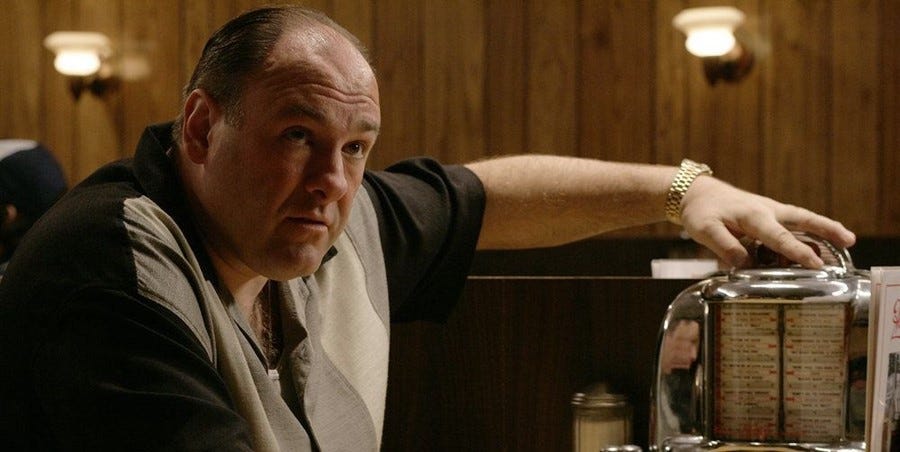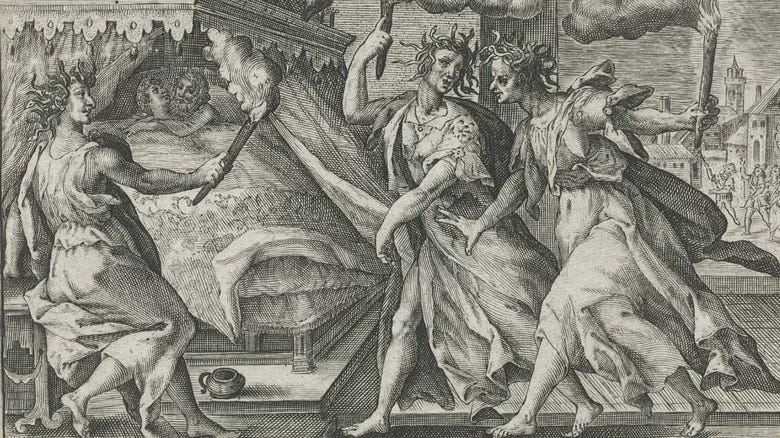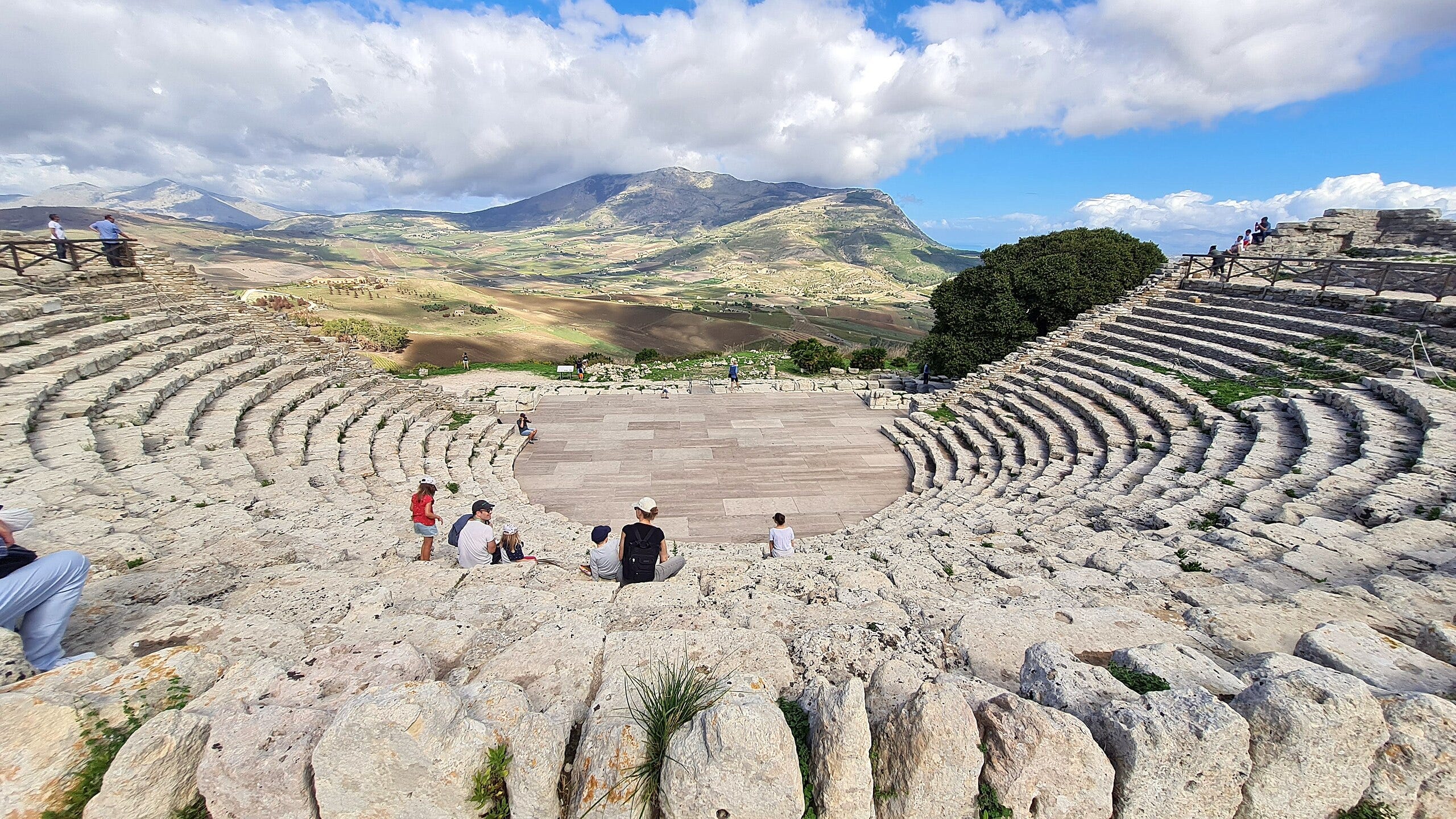Readers pursuing my 52-week humanities immersion course may have arrived at ancient Greek drama (mostly tragedies). The readings are:
They didn’t have warning labels for stories back in antiquity, but the Greeks could very easily have invented them for these dramas. The famous tragedies are confounding and often disturbing—sometimes quite violent. So how do we approach them? Below I offer some perspectives and suggestions. If you want to support my work, please take out a premium subscription (for just $6 per month).(1) Greek tragedies are like the last episode of The Sopranos.These ancient stories are like riddles. They force us to ask questions—and refuse to give you easy answers. They stir up arguments. Even when you know what’s happening, you’re not sure what it actually means. In contemporary society, people are deeply unsettled by stories like this. That’s why fans of The Sopranos kept asking producer David Chase to explain things. They demanded that he tell them whether the story had a happy ending or a sad ending. But how would that change our understanding of Tony Soprano? Would it impact what we’ve learned about him—or from him? Let’s say he lives, and continues committing crimes, and whacking other mobsters. Is that really a happy ending? Let’s say he dies—something that will happen to him sooner or later (much as it did to actor James Gandolfini). Does that repay anything to anybody, or shift the scales of his life’s meaning in any demonstrable way? Greek tragedy teaches us that there’s no final rescue or explanation in the last scene—and certainly nothing resembling human justice. When you want to assess a person’s life, you don’t judge it by the cause of death in the obituary. Life doesn’t work that way. Only stories do—and the ancients were rightly distrustful of those types of stories. It’s hard for us the recapture that spirit in the current day, but these tragedies force us to do so. (2) That’s why Greek tragedies are more like real life than your current-day Netflix show.Hollywood designs most movies and TV series on the basis of what Freud called wish fulfillment. That’s why they almost always have happy endings. Audiences hate sad endings. The studios know this and usually stick to the happily-ever-after formula.
I’ve noticed an exception—and it’s worth mentioning. Long-running TV series in their pre-announced final seasons love to punish their main characters. I believe this represents another Freudian tendency. The people running these shows have built up repressed anger at the fictional characters who have controlled their lives for so many years. And now they exact revenge in the final episode. This is like Freud’s Oedipus complex—the desire to destroy the very thing that gave you life. It’s a notion that coincidentally (or maybe not) derives from the Greek tragedies we’re reading this week. But those exceptions don’t change the basic formula. More than 90% of Hollywood stories have happy endings. (I’ve heard some estimates that it’s as high as 99%—but we lack reliable measures.) And the public prefers this—even when the resolutions are improbable and unrealistic. This is why Netflix has never released Oedipus: The Miniseries—and never will. Greek tragedy is too disturbing to the modern sensibility. These stories remind us of the shortness of life, the unpredictability of human affairs, the risks we take when we embark on any ambitious personal venture, and other painful truths. Critic George Steiner, in his book The Death of Tragedy, claims that pure tragedy is almost unbearable, and gives credit to the Greeks for inventing this brave type of storytelling. By contrast even The Book of Job—the gloomiest story in all holy scripture—serves up an implausible happy ending in the final scene. Only the Greeks were courageous enough to dispense with such comforts and face destiny straight in the face, never blinking. None of these stories would get funded by Hollywood today, not even for a test pilot episode. And that’s exactly why it’s so mind-expanding to encounter these dramatic scenarios. (3) But you need to forget what people have told you about “tragic flaws.”In our own time, we prefer a simpler—but shallow—view of tragedy. We assign blame to the hero, who has a tragic flaw, and hence deserves the resulting punishment. This is the kind of tragedy we encounter in The Godfather films or Breaking Bad. And it’s a riveting story in its own right. It provides for exciting narrative shifts, and even as we mourn the punished protagonist, our sense of justice is secretly nurtured. But that’s now how they roll in ancient Athens. The Greek word hamartia is often translated as tragic flaw, but it can also mean a mistake or error, or even a random accident. So let’s not be too quick in blaming the victim (in today’s parlance) when we encounter these ancient dramas. That’s why, at the end of his life, Oedipus complains that he doesn’t deserve his punishment. And the audience sympathizes with him—he never intended to kill his father and sleep with his mother. He made his worst mistakes through ignorance, not malice. It’s almost as if a vengeful fate is punishing him. And, indeed, that’s why the goddesses of vengeance—known as the Eumenides or, in English, the Furies—sometimes show up as actual presences in these plays. If you understand the true pathos of the human condition, their arrival on the scene should be scarier than any movie monster or villain. It’s easier to deal with Godzilla knocking down buildings in Tokyo than confronting your vengeful deity face-to-face—especially in the final stages of a tragic life. (4) That doesn’t mean that these stories don’t have clear, powerful endings.Unlike The Sopranos, however, Greek tragedians, don’t stop in the middle of a scene. The story does provide resolution. And sometimes we even get a hint of redemption—as at the end of the Eumenides or Oedipus at Colonus—for the community, if not for the protagonist. This too is intensely realistic. As we know from our experiences with death and loss, things must go on. And that’s true whether or not we feel prepared to continue. At best, we grab on to a new starting point, and try to find something to build on in the face of our personal tragedy. That’s why René Girard developed his theory of sacrificial violence from studying these ancient tragedies. He saw that the death of the victim is both an end and a new beginning. Trying to balance out the costs and benefits may be beyond human metrics, but that tension gives depth and power to the story. (5) Here’s the best part—you get to play a role on the stage in these stories. Not even Netflix lets you do that.These plays always feature a chorus on the stage—but that term doesn’t do full justice to the role of these onlookers. The chorus is typically more aware than the actual protagonists, with a more prudent understanding of what’s unfolding. But they are powerless to change the nature of events. They are anguished viewers. In other words, they are like us in the audience.
This is such an emotionally riveting concept that I’m surprised modern film doesn’t incorporate something like it more often. (Postmodern fiction, with its willful breakdown of divisions between story and readers comes closer—but too often uses this tool in frivolous ways.) So don’t misunderstand the chorus here. They aren’t like backup singers in a pop band, who just repeat what the lead singer says. This isn’t Gladys Knight and her Pips leaving on a midnight train to Georgia. Greek choruses are not an echo chamber. The ancient chorus is, instead, a surrogate for the audience, maybe even an advocate on stage. It provides the contextual fabric for everything that transpires. Finally, for a thought experiment, imagine what modern on-screen tragedies (examples: The Godfather or Breaking Bad or Chinatown or The Americans or Citizen Kane or The Sopranos) would be like if a chorus was present at every scene, offering advice and guidance. You're currently a free subscriber to The Honest Broker. For the full experience, upgrade your subscription. |
Search thousands of free JavaScript snippets that you can quickly copy and paste into your web pages. Get free JavaScript tutorials, references, code, menus, calendars, popup windows, games, and much more.
How to Read Greek Tragedy in a Netflix World
Subscribe to:
Post Comments (Atom)
Top 3 UX Design Articles of 2024 to Remember
Based on most subscriptions ͏ ͏ ͏ ͏ ͏ ͏ ͏ ͏ ͏ ͏ ͏ ͏ ͏ ͏ ͏ ͏ ...
-
code.gs // 1. Enter sheet name where data is to be written below var SHEET_NAME = "Sheet1" ; // 2. Run > setup // // 3....




No comments:
Post a Comment